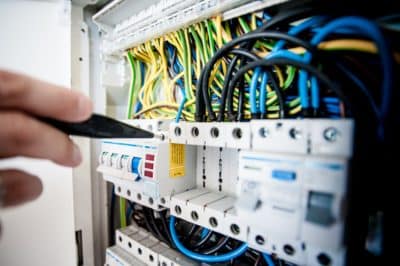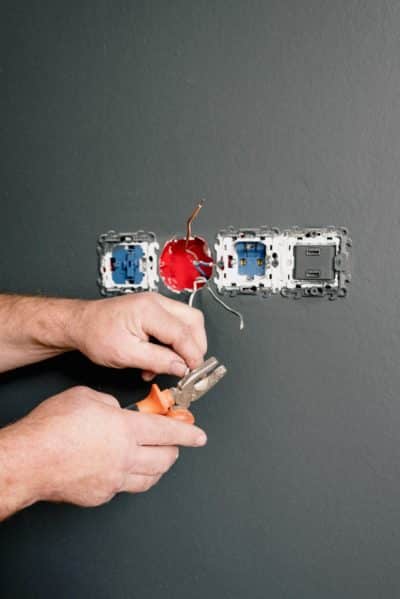An electrician can work for multiple different businesses. Schools, houses, restaurants, and apartment buildings all need electricity. Although the clientele is very versatile, there are two main types of electrical systems: residential and commercial.
IMAGE: PEXELS
Residential vs. Commercial
Electricity benefits people in different ways. While everyone needs basic electricity that can turn on lights or charge electronic devices, some buildings require more. For certain industries, electricity might have to power high-energy plants or factories. Depending on the individual needs of a client, their electrical system may be different.
Commercial Services
A commercial system can serve restaurants, medical facilities, retail stores, factories, and warehouses. Commercial businesses may reside in large buildings with dozens of people. Typical electric services provided for commercial customers can include:
- re-wiring
- new circuitry
- outdoor lighting
- fire alarm systems
- security systems
- intercoms
Residential Services
Residential customers typically need services for one home. Residential services can be provided for houses, condos, and even large apartment complexes. Some of the services a residential electrician can perform include:
- installing and maintaining wiring
- fixing relays and switches
- repairing power outlets
- re-wiring
- replacing broken components
Both types of electrical systems are necessary for any town. Without proper electrical services, cooking, charging devices, seeing clearly, and accessing the internet can be impossible. Thomas Pacchioli can provide the services necessary for multiple electrical systems.
What Is An Electrical System?
An electrical system consists of all of the elements needed to distribute electrical power, including overhead and underground lines, poles, transformers, and other equipment such as a motor – an electric device that consumes electric energy to rotate a device in an electric system.
The electrical system produces voltage and current sources. By isolating faulty electrical equipment, electrical systems can be protected. Fuses can then trip other circuit breakers in the process of re-wiring. Electrical systems are responsible for both the electricity in a home and the electricity in an office or warehouse.
Residential Systems
To provide residential wiring, an electrician like Thomas Pacchioli must have the proper training and education. Residential wiring is usually hidden behind walls but requires fewer wires than a commercial business. Knowing how to access these safely is key when performing a residential job.
To become an electrician, schooling and on-the-field training are required. An apprenticeship will help with the last part of the process before working independently. A residential electrician can complete a trade school and work as an apprentice without needing additional skills and experience.
Residential electricians will usually use a single-phase system that has a range of approximately 120V-240V. This power shift means that the tools necessary for a residential electrician may differ when compared to a commercial job. Thin gauge cabling with less sheathing is often used with different breakers.
Residential homes usually provide color-coded wires that can help technicians to work quickly. Metal conduits or panduit ducts are also sometimes provided inside the system. By limiting the potential damage to wiring, these ducts and conduits can help with installation.
Commercial Systems
Commercial electricians typically need a higher power supply. Many technicians carry anywhere between a 120V and a 480V conductor. The wiring must change to meet the needs of the increased electricity. Wires with more insulation and sheathing are ideal for commercial systems.
The current flow in a cable will likely perform at an almost continuous rate. These wires are typically made from heavy-duty material and are contained in a durable tube. Thick gauge wires are usually seen passing through the ceiling rafters. While they do need extra protection, these wires are usually easy for a trained electrician to access.
Finding a commercial electrical system is relatively easy. They are designed to be accessible for electricians to reach in case of an immediate power failure. Since commercial systems tend to break down faster than residential systems, they frequently need more maintenance. A commercial electrician may need extra training to handle these systems.
Commercial systems can be complex, and it may take additional education to install. The three-phase system, phase diagrams, control systems, and higher voltage balance can create the need for additional training. In general, commercial systems power large buildings like malls or warehouses. Since a higher voltage is usually necessary for these types of projects, safety is essential.
How Much Power Is Enough?
The power load requirements of both commercial and residential systems are different. Since residential systems do not need as much power as commercial systems, they use what is known as “single-phase power”. The amount of voltage used in a residential system is not usually lethal.
The “Three-phase design” is used for commercial systems because there are two smaller supplies of voltage. By using three supplies, each supply can operate at a lower capacity to create optimal efficiency.
Safety Regulations For Commercial And Residential Electricians
Both businesses and homeowners should never try to fix an electrical system on their own. When the power goes out, it can be tempting to try and re-wire the system by reading books or watching online videos. It takes schooling and on-the-job training to be able to manage an electrical system. Calling an electrician like Thomas Pacchioli is always preferable to a potentially risky DIY job.
Both commercial and residential systems require electricians to follow safety regulations. Safety guidelines help train electricians to know the proper way of handling complex circuitry. Without a thorough knowledge of electricity and how it is conducted, electrical shocks and fires can occur.
If you are interested in even more technology-related articles and information from us here at Bit Rebels, then we have a lot to choose from.


COMMENTS